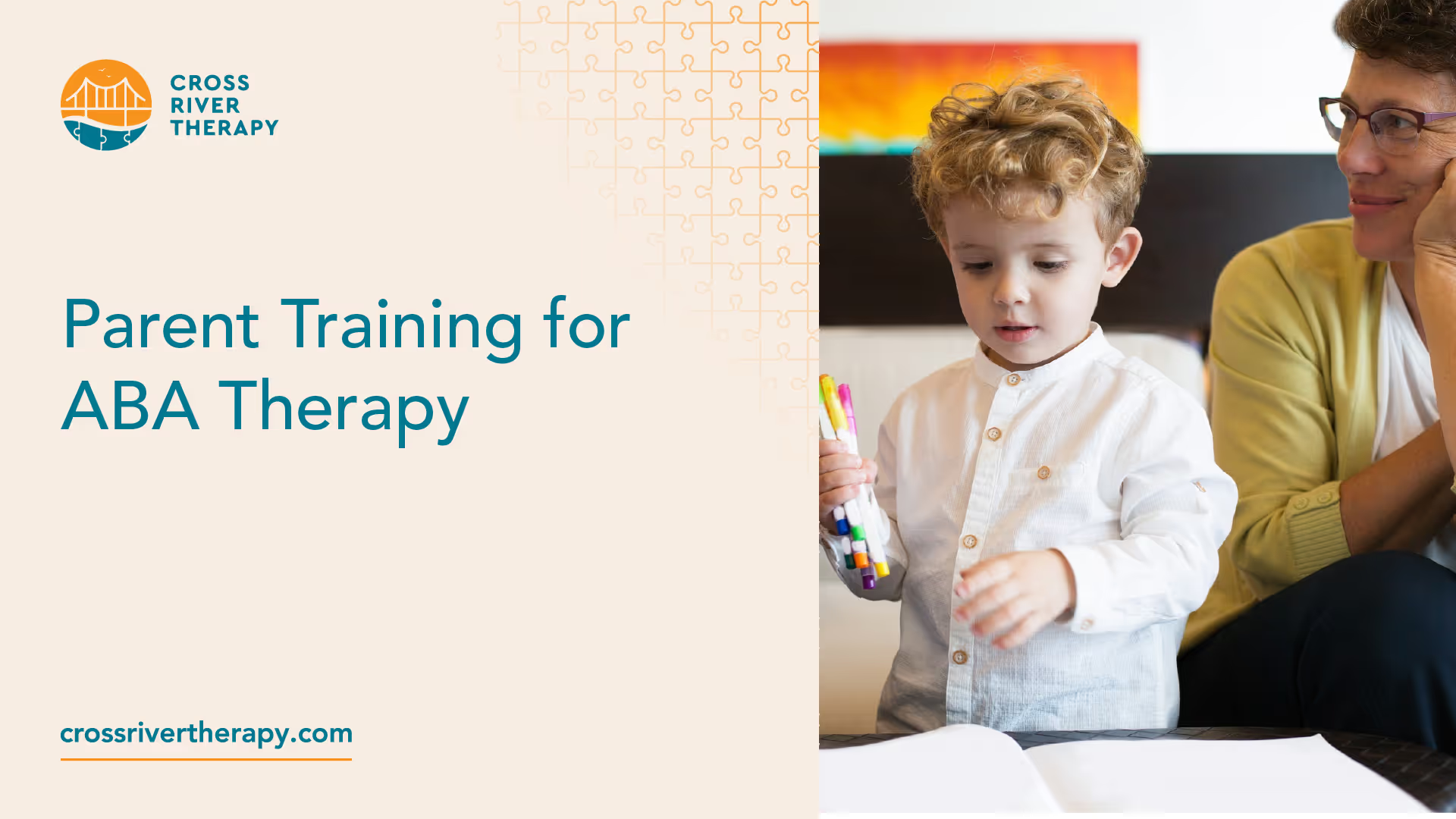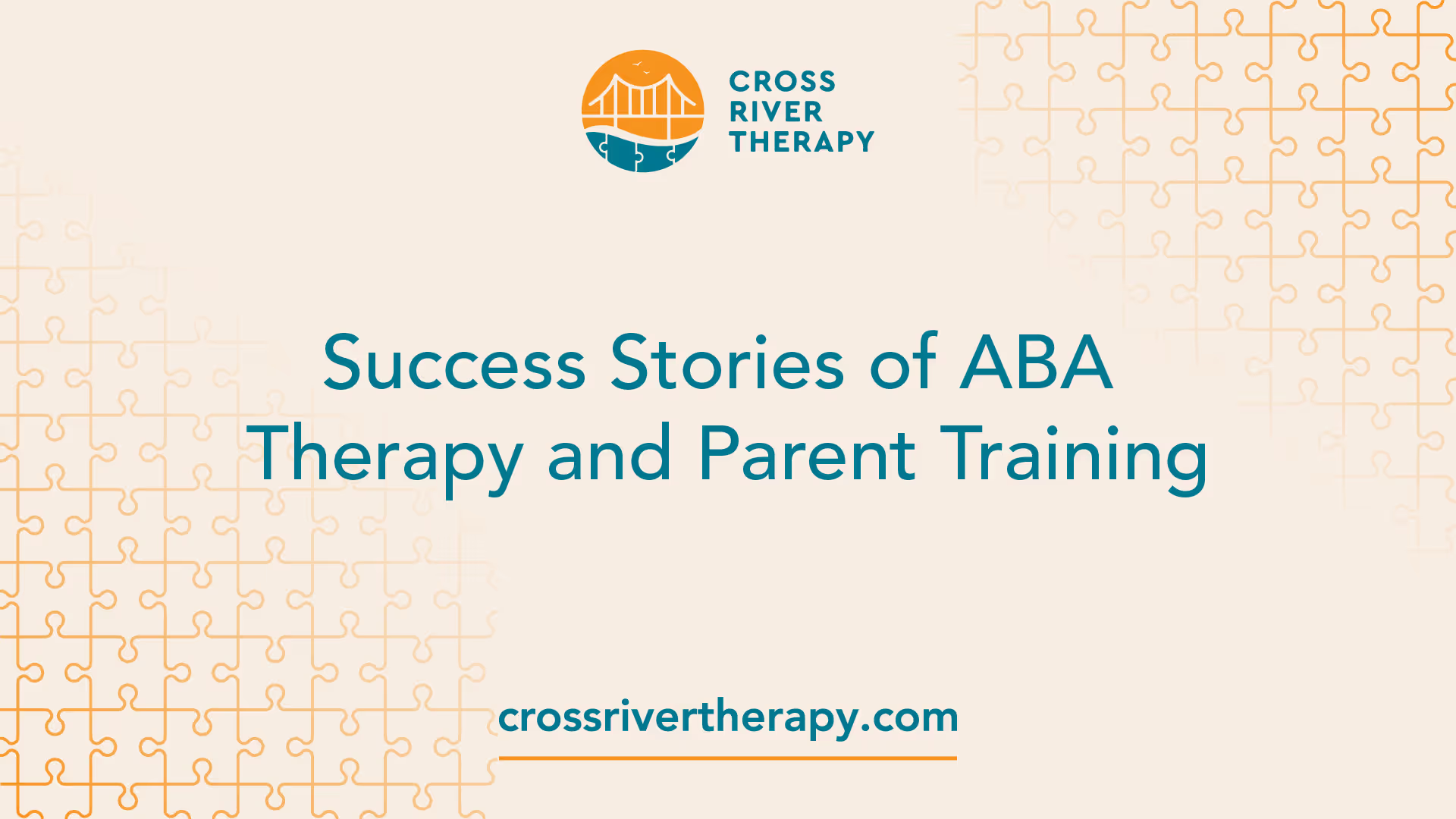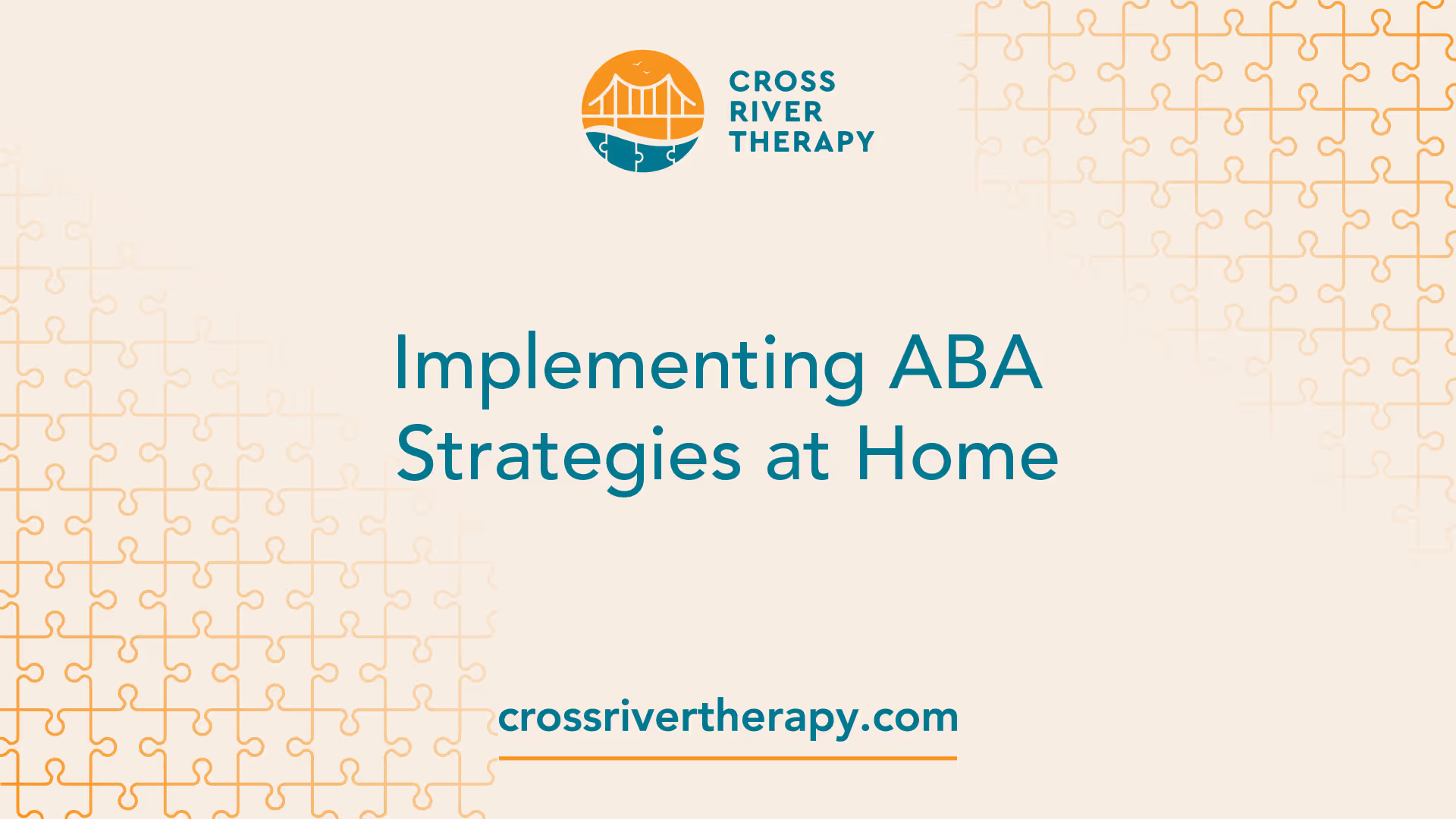Parent Training for ABA Therapy
Learn how parent training in ABA therapy can help your child thrive.
Understanding Parent Training in ABA Therapy
Parent training is an integral component of Applied Behavior Analysis (ABA) therapy for individuals with autism and related developmental differences. It offers significant benefits to both parents or caregivers and the individual receiving therapy. Recognizing the importance of parent training is crucial in maximizing the effectiveness of ABA therapy and promoting positive outcomes.

Importance of Parent Training
Parent training in ABA therapy is critical as it empowers caregivers to implement interventions effectively, understand behavior principles, and support their child's progress at home. It provides parents with the necessary skills and knowledge to reinforce and generalize the strategies and techniques learned during therapy sessions [1]. By involving parents in the therapeutic process, it ensures continuity of care and promotes consistency in implementing behavior management strategies.
Furthermore, parent training helps parents develop a deeper understanding of their child's unique needs and challenges, fostering empathy and strengthening the parent-child relationship. By actively participating in their child's therapy, parents become advocates and partners in their child's developmental journey.
Benefits for Parents and Children
Parent training in ABA therapy offers numerous benefits for both parents or caregivers and the child receiving therapy. For parents, it provides a sense of empowerment and confidence in their ability to support their child effectively. By equipping them with the necessary tools and strategies, parent training allows parents to actively participate in their child's progress, promoting a sense of fulfillment and satisfaction.
For children, parent training enhances the effectiveness of ABA therapy by facilitating generalization of skills across different settings. The skills learned in therapy can be reinforced and practiced in naturalistic environments, such as the home or community. This generalization of skills helps children apply what they have learned to real-life situations, promoting independence and functional abilities.
Moreover, parent training ensures the maintenance and retention of essential skills over time. By involving parents in the therapeutic process, children have consistent support and reinforcement even outside of therapy sessions. This ongoing involvement helps solidify the progress made during ABA therapy and promotes long-term success.
By emphasizing the importance of parent training in ABA therapy, parents can actively contribute to their child's growth and development. The collaboration between ABA professionals and parents is key to promoting positive outcomes and ensuring the continued progress of children with autism.
Success Stories of ABA Therapy and Parent Training
Parent training in ABA therapy has shown remarkable success in helping children with autism spectrum disorder (ASD) develop essential skills and improve their overall quality of life. Through parent training, parents can actively participate in their child's therapy and become effective advocates for their progress. Here are some success stories highlighting the positive outcomes of ABA therapy combined with parent training.

Progress in Communication and Social Skills
One success story involves Sam, a 4-year-old boy with ASD. ABA therapy and parent training led to significant progress in Sam's communication and social skills. Sam began using more words to express himself and became more engaged during social interactions. This progress allowed him to better connect with others, fostering meaningful relationships [2].
Mia, a 6-year-old girl with autism, also experienced notable improvements in her communication and social skills through ABA therapy and parent training. Her challenging behaviors decreased significantly, and her parents gained the skills to prevent and address these behaviors effectively. This positive change resulted in reduced stress and an improved quality of life for Mia and her family.
Managing Challenging Behaviors
ABA therapy, combined with parent training, has proven effective in managing challenging behaviors in children with ASD. Sarah, a 12-year-old girl with autism, made remarkable progress in daily living skills through ABA therapy and parent training. She became more independent in tasks such as dressing, grooming, and preparing meals. This newfound independence contributed to a more self-sufficient and confident young girl.
Alex, a 9-year-old boy with autism, benefited from ABA therapy and parent training to manage sensory sensitivities. His therapy and parent training resulted in more manageable sensitivities, reduced sensory-related challenging behaviors, and an overall improved quality of life [2].
By addressing challenging behaviors, parents and ABA professionals work together to identify underlying functions of behaviors, develop targeted interventions, and use proactive strategies to create a harmonious home environment. This collaborative approach allows parents to gain valuable skills in managing and addressing challenging behaviors effectively.
These success stories highlight the transformative impact of ABA therapy and parent training on children with autism. Parent involvement is fundamental to the success of ABA therapy, as parents play a critical role in driving progress, fostering positive outcomes, and supporting their children in therapy sessions and daily life.
The effectiveness of ABA therapy and parent training is supported by meta-analyses and efficacy studies, which demonstrate the positive impact of parent training on managing disruptive behavior in children with ASD. With the right support, guidance, and training, parents can become powerful agents of change, nurturing their child's growth and development through ABA therapy.
Implementing ABA Strategies at Home
When it comes to ABA therapy for children diagnosed with autism, parent training plays a crucial role in the overall success of the therapy. Through parent training in ABA, parents can learn to help their child generalize new behaviors and use behavior plans to reduce challenging behaviors at home or in the community, resulting in less stress for parents and caregivers [5]. Let's explore two important aspects of implementing ABA strategies at home: generalization of new behaviors and behavior plans for challenging behaviors.

Generalization of New Behaviors
Generalization refers to the ability to apply newly learned skills or behaviors across different settings and situations. It is essential to ensure that the skills acquired in ABA therapy sessions are generalized to the child's daily life. Parents play a vital role in facilitating the generalization process.
To promote generalization, parents can:
- Practice skills in various environments: Encourage your child to apply the newly learned skills in different locations, such as home, school, or the community. This helps the child recognize that the skills are relevant across different contexts.
- Utilize naturalistic teaching opportunities: Look for natural opportunities in everyday activities to reinforce and practice the targeted skills. For example, if your child is working on communication skills, encourage them to use those skills during playtime or mealtime.
- Collaborate with the ABA team: Maintain open communication with the ABA professionals working with your child. They can provide guidance on specific strategies to promote generalization and help tailor the interventions to fit your home environment.
By incorporating generalization techniques into your daily routines, you can help your child transfer the skills learned in therapy to real-life situations, promoting long-term success and independence.
Behavior Plans for Challenging Behaviors
Addressing challenging behaviors is another important aspect of implementing ABA strategies at home. Behavior plans are personalized strategies designed to reduce or replace challenging behaviors with more appropriate alternatives. These plans are developed based on a thorough understanding of the function and triggers of the behavior.
Parents can collaborate with the ABA professionals to create behavior plans that include:
- Antecedent strategies: Identify and modify the factors that trigger challenging behaviors. This may involve making changes to the environment or adjusting routines to prevent the occurrence of challenging behaviors.
- Replacement behaviors: Teach and reinforce alternative behaviors that serve the same function as the challenging behavior. For example, if a child engages in hitting when frustrated, teach them to use appropriate communication skills to express their needs or emotions.
- Consequence strategies: Determine appropriate consequences for both the challenging behavior and the replacement behavior. Consistency and positive reinforcement are key components of effective consequence strategies.
It's important to note that behavior plans should be individualized to meet the specific needs of each child. Regular communication with the ABA professionals is crucial to ensure the plan is effective and to make any necessary adjustments.
By implementing behavior plans and consistently reinforcing positive behaviors, parents can support their child's progress and create a harmonious home environment. Remember, addressing challenging behaviors is a collaborative effort between parents and the ABA team, with the ultimate goal of helping the child thrive and reach their full potential.
Overcoming Barriers in Parent Training
Effective parent training in ABA therapy is crucial for the progress and success of children with autism. However, there are certain barriers that may hinder the implementation of parent training programs. Two common barriers include time constraints and payor requirements, as well as addressing personal experiences and stress.
Time Constraints and Payor Requirements
Time constraints can be a significant challenge when it comes to parent training. Parents often have busy schedules with work, household responsibilities, and other commitments. Finding the time to attend training sessions and implement strategies at home can be difficult. To overcome this barrier, strategies like delegating planning to staff, using parent training curriculums, or creating a loose plan supplemented with off-the-cuff responses during sessions can be helpful.
Additionally, payor requirements can impact the accessibility of parent training. Most insurance companies require parent training goals in treatment plans, and training is often provided by Board Certified Behavior Analysts (BCBAs) in ABA programs. While Board Certified Assistant Behavior Analysts (BCaBAs) can also provide parent training under supervision, some insurance companies have stricter guidelines regarding billing for services [6]. It's important for parents to understand the requirements set by their payors and work closely with their ABA providers to ensure that they meet the necessary criteria.
Addressing Personal Experiences and Stress
Addressing personal experiences and stress is essential in effective parent training. Parents of children with autism may have various personal experiences that can impact their ability to fully engage in the training process. Understanding and addressing these experiences can lead to better outcomes. Parent stress, in particular, can interfere with relationships and often lead to a failure to follow through with recommendations from BCBAs. It's important to acknowledge and address parent stress to ensure successful parent training outcomes.
ABA professionals should consider the individual circumstances of each parent and provide support and guidance to help them manage their stress. By creating a supportive and empathetic environment, parents can feel more comfortable discussing their concerns and challenges. This enables the development of personalized strategies to address their unique needs. It's important to remember that addressing personal experiences and stress is an ongoing process that requires open communication and collaboration between parents and ABA professionals.
By recognizing and actively addressing these barriers, parents can overcome challenges and fully engage in the parent training process. ABA professionals play a crucial role in providing the necessary support, guidance, and resources to help parents navigate these barriers. Through collaboration and understanding, parents can acquire the skills and knowledge needed to effectively implement ABA strategies at home and support their child's progress in therapy and daily life.
For more information on ABA therapy and parent training, you can explore our articles on ABA therapy techniques for beginners and how to implement ABA therapy at home.
Role of ABA Professionals in Parent Training
In the world of Applied Behavior Analysis (ABA) therapy, the role of ABA professionals in parent training is crucial for the success of the therapy and the overall progress of the child. Effective collaboration and a strong partnership between ABA professionals and parents are key to achieving positive outcomes.
Collaboration and Trust
Collaboration between ABA professionals and parents begins with trust, open communication, and establishing clear, measurable goals aligned with the child's needs and aspirations [3]. ABA professionals work closely with parents to involve them in the therapy process, ensuring that they understand the strategies and techniques being used. By collaborating with parents, ABA professionals can gain valuable insights into the child's behavior patterns, preferences, and progress.
This collaboration allows parents to actively participate in the therapy sessions and reinforces the child's learning and progress outside of the therapy setting. ABA professionals provide guidance, support, and regular feedback to parents, empowering them to implement ABA strategies effectively at home. By working together, both parents and ABA professionals can ensure consistency in the child's environment, leading to more successful outcomes.
Building Rapport and Understanding
Building rapport and understanding between ABA professionals and parents is essential for the success of parent training. ABA professionals strive to create a supportive and collaborative environment where parents feel comfortable expressing their concerns, asking questions, and actively participating in the therapy process.
By fostering a positive relationship with parents, ABA professionals can adapt to different family dynamics and cultures, improving their own understanding of behavior analysis concepts and making them better practitioners [5]. This understanding allows ABA professionals to tailor the therapy to meet the unique needs of the child and their family.
Through ongoing communication and regular meetings, ABA professionals and parents can discuss progress, address any challenges or concerns, and make necessary adjustments to the therapy plan. This collaborative approach ensures that the therapy remains effective and relevant to the child's evolving needs.
The role of ABA professionals in parent training goes beyond the therapy sessions. They play a vital role in empowering parents to support their child's progress at home, helping them understand behavior principles, and providing guidance on implementing interventions effectively [1]. By equipping parents with the knowledge and skills they need, ABA professionals empower them to be active participants in their child's journey.
By fostering collaboration, trust, and understanding, ABA professionals lay the foundation for successful parent training, ultimately leading to positive outcomes for the child receiving ABA therapy. The partnership between ABA professionals and parents is aimed at unlocking the child's potential and promoting their overall development.
Evidence-Based Practices in Parent Training
When it comes to parent training in ABA therapy, evidence-based practices play a vital role in ensuring effective outcomes for children with autism spectrum disorder (ASD). These practices are backed by scientific research and have been shown to be beneficial in improving various aspects of a child's development. Two key aspects of evidence-based parent training include meta-analyses and efficacy studies, as well as utilizing ABA strategies in daily life.
Meta-Analyses and Efficacy Studies
Meta-analyses, which involve pooling data from multiple studies, have provided valuable insights into the effectiveness of different parent training interventions for children with ASD. According to a study published in the National Center for Biotechnology Information (NCBI) (source), various parent training interventions have demonstrated positive treatment effects on symptoms of children with ASD. Meta-analyses of interventions such as DIR/Floortime, Pivotal Response, and parent-focused training have shown small to moderate treatment effects.
Additionally, a Cochrane Review highlighted the effectiveness of parent-mediated interventions for young children with ASD, particularly in improving parent-child interaction, child language comprehension, and reducing autism severity [4]. However, the review also emphasized the need for a common set of outcome measures due to the current low quality of evidence.
Utilizing ABA Strategies in Daily Life
Utilizing ABA (Applied Behavior Analysis) strategies in daily life is a key component of evidence-based parent training. These strategies are rooted in the scientific field of behavior analysis and have been tested and proven to support children with ASD, ADHD, and other behavioral challenges. By incorporating ABA strategies into daily routines, parents can reinforce and generalize the skills learned in therapy sessions, promoting consistency and long-term progress.
Implementing ABA strategies in daily life not only brings about behavioral improvements in the child but also strengthens the emotional bond between the parent and the child, building a strong parent-child relationship. By consistently using these strategies, parents can create a supportive and structured environment that facilitates their child's learning and development.
By utilizing evidence-based practices, such as those supported by meta-analyses and efficacy studies, along with incorporating ABA strategies into daily life, parents can play a crucial role in the progress and success of their child's ABA therapy journey. These practices offer numerous benefits, nurturing independence and skill development in children, building a strong parent-child relationship, facilitating generalization of skills across different settings, and ensuring maintenance and retention of essential skills.
References
[1]: https://behavioral-innovations.com/blog/importance-of-parent-training-aba-therapy/
[2]: https://www.rainbowtherapy.org/benefits-of-parent-training-in-aba-therapy/
[3]: https://positivesolutionsbehaviorgroup.com/the-role-of-parent-involvement-in-aba-therapy/
[4]: https://www.ncbi.nlm.nih.gov/pmc/articles/PMC7720449/
[5]: https://www.abaparenttraining.com/home/2022/2/8/why-is-parent-training-important-in-aba-applied-behavior-analysis
[6]: https://masteraba.com/aba-parent-training-the-complete-guide-to-helping-parents-succeed/



